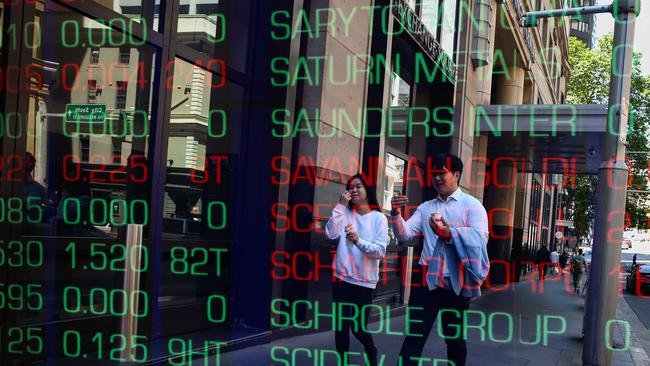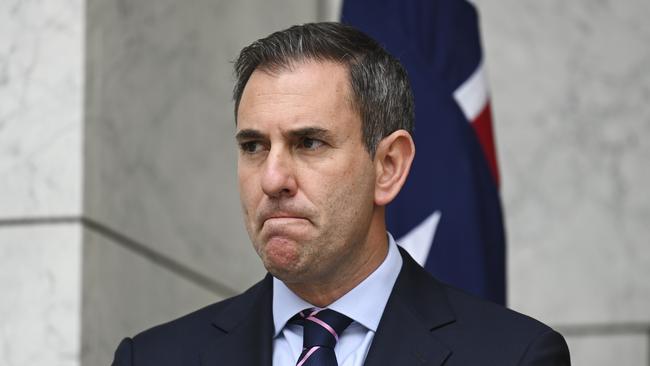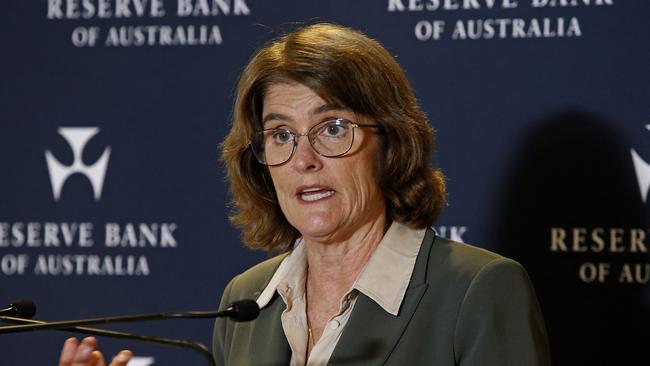RBA announces new interest rate decision, holding at 4.35 per cent
The Reserve Bank is sticking to its guns not to cut the official cash rate while inflation remains too high, despite growing pressure to do so.
Interest Rates
Don't miss out on the headlines from Interest Rates. Followed categories will be added to My News.
The Reserve Bank has held the cash rate at 4.35 per cent following its board meeting on Tuesday, flagging that inflation is “still too high”.
The seventh consecutive hold was widely tipped by economists and investors, which means homeowners will be slugged with the 13-year high cash rate until at least November 5, Melbourne Cup Day, when the board is slated to meet next.
In a statement, the RBA acknowledged inflation had “fallen substantially” but it was still beyond the “midpoint” of the board’s target band of 2 to 3 per cent.
The board again indicated further rate rises could be in play.
“The board is not ruling anything in or out. Policy will need to be sufficiently restrictive until the board is confident that inflation is moving sustainably towards the target range,” the RBA statement said.
It warned there was a “high level of uncertainty” on future rate decisions, and while other central banks had begun cutting rates, they remained “alert to risks” and “geopolitical uncertainties remain pronounced”.
The board reiterated “returning inflation to target within a reasonable timeframe” was its highest priority, stating underlying inflation, currently at 3.7 per cent, was still too high.
According to its August forecasts, the all-important figure is not predicted to fall into the target range until late 2025, before it reaches the midpoint in 2026.

Governor Michele Bullock said the central bank’s outlook had not changed since the August meeting, stating that progress on moving underlying inflation has “been slow”.
However unlike previous meetings, the board did not consider a rate hike.
“We’ve considered in detail whether our current settings are sufficiently restrictive and judged that based on what we know at the moment,” she said.
Ms Bullock said the board would not lower rates until it was “confident” underlying inflation was reduced, and said the board remained “vigilant to the upside risk to inflation”.
While Wednesday’s monthly inflation update is tipped to show headline inflation has dropped to 2.7 per cent – within the RBA’s target range – Ms Bullock warned the figures were “volatile”.
Although she said this would be “reflecting cost-of-living relief,” which “was important,” it was “not really reflective of the underlying inflation”.
Asked why Australia was lagging behind other countries, including the US where the Federal Reserve Bank cut rates by 50 basis points last week, she said Australia’s domestic markets are different.

She said Australia’s cash rate had not been increased as high, with most overseas interest rates hiked to more than 5 per cent. Australia’s labour market also remained resilient, with our unemployment rate currently at 4.2 per cent.
“We didn’t go up as high (and) we haven’t seen the same deterioration in the labour market as some of these countries,” she said.
Bullock recognises households are struggling
Ms Bullock also reiterated her comments that the RBA board is aware households are struggling.
This follows her remarks from earlier this month, wheret she acknowledged some households would need to sell their homes due to the rising cost of living, and consecutive rate hikes, with the financial burden largely falling on low-socio economic and younger households.
However, she said the RBA only had “one instrument” to lower inflation, which was interest rates.
“The government has more tools at its disposal, but we only have the one instrument,” she said.
While she acknowledged it was a “blunt” tool, she said families would be further hurt by widespread unemployment.
“One of the most important things for people to be able to continue to meet their expenses and keep their homes is that they have employment,” she said.
“That’s why it’s so important for us that we get this balance between bringing inflation down while trying to keep the gains in the labour market.”
BDO economics partner Anders Magnusson said the RBA needed to hold rates, given sticky underlying inflation.
“The RBA’s decision today to hold its ground is commendable in the face of political pressure and the massive rate cut by the US,” he said.
While he acknowledged home owners were under pressure, he said a premature rate cut would “worsen the cost-of-living squeeze by bringing back inflation”.
“While inflation was increasing, the RBA did not raise interest rates as high as its global peers,” he said, with the US Federal Reserve Bank cutting rates by 50 basis points last week.
“Instead, it maintained a balanced approach. This shows that it does not believe in causing harm by raising interest rates too high or too soon, but it also means that that a cut is further away for us than our peers.”
Chalmers: Rate rises slowing economy
Speaking to Sky News, Treasure Jim Chalmers said it was a positive sign rates had not increased since November last year, when they were raised to 4.35 per cent.
On Sunday, Dr Chalmers said Treasury forecasting had tipped a Wednesday’s inflation update would reveal a considerable drop in headline inflation, in either the “low threes or the high twos”.
“That’s a good thing we are making welcome and encouraging progress in the fight against inflation, and the fact that rates haven’t gone up for the best part of the year now is an indicator of that,” he said.
He dismissed questions asking him whether he was “dissapointed” the RBA didn’t move to cut rates, and said he would not “second guess decisions taken by the independent Reserve Bank”.

“I’ve made that very clear repeatedly. I’ve made a factual statement that the interest rate rises, which are already in the system, combined with some of these other factors, are slowing our economy quite dramatically,” he said.
“We saw that in the most recent national accounts, but these decisions are taken independently by the Reserve Bank.”
Shadow Treasurer Angus Taylor said that while headline inflation was tipped to fall on Wednesday, largely due to the effect of state and federal interest rates, this would not affect rates.
He said Australia was both “at the back of the pack in fighting and beating inflation” and “at the back of the pack in bringing down interest rates”.
“We are clearly at the back of the pack in the United States and Canada, in the UK, in Europe, in New Zealand, we’re seeing interest rates coming down, not in Australia,” he said.
“Our core inflation hasn’t come down since January this year. Since January this year, every other peer country in the world has seen a reduction in core inflation since January.”
Three out of the big four banks have tipped rates to remain at 4.35 per cent until February 2025 at the earliest, with CBA the outlier.
It predicts the RBA will move on its first rate cut at its pre-Christmas meeting, with five cuts to 3.1 per cent.
Both Westpac and ANZ are estimating a February cut, with Westpac forecasting four cuts bringing the cash rate to 3.35 per cent, and ANZ tipping three to 3.6 per cent.
NAB are the most hesitant, forecasting rates to remain high until May, after which the RBA will implement five cuts, bringing down the cash rate to 3.1 per cent.
Originally published as RBA announces new interest rate decision, holding at 4.35 per cent





